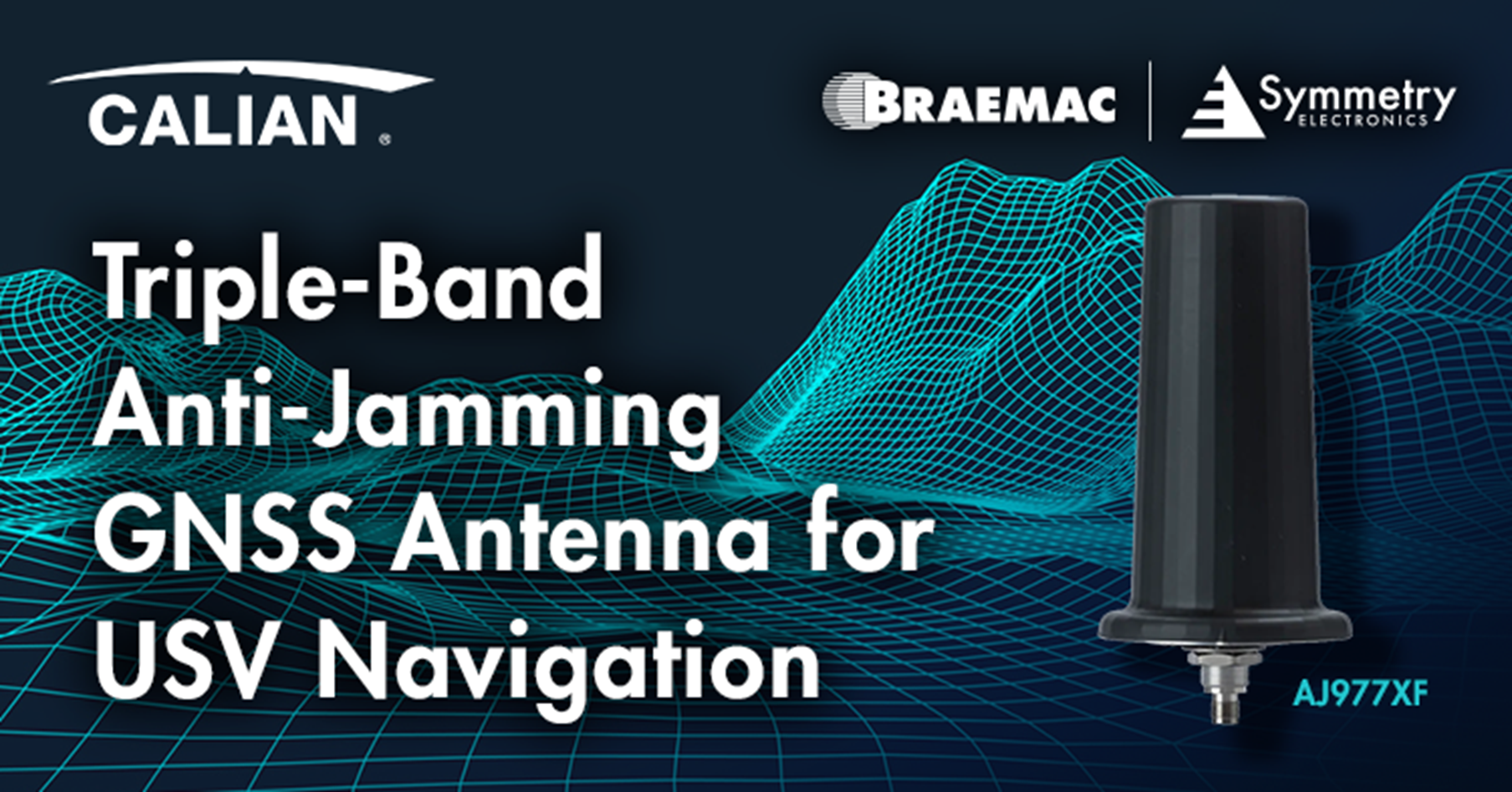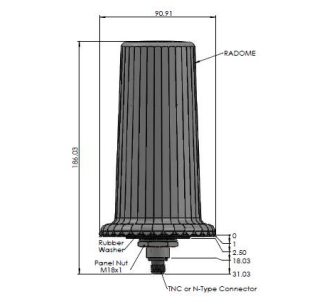- Home
- Braemac Blog
- Triple-Band Anti-Jamming GNSS Antenna for USV Navigation
Triple-Band Anti-Jamming GNSS Antenna for USV Navigation
Calian AJ977XF
About Jari Haiston

From ocean vessels to aerial drones, modern uncrewed systems rely on precision GNSS navigation for safe, effective operation. However, intentional and unintentional interference presents serious risks to positioning and mission-critical data. That’s why the Calian AJ977XF triple-band anti-jamming antenna is ideal for autonomous navigation in interference-prone environments. The AJ977XF is purpose-built to mitigate jamming threats with a low-elevation null formed radiation pattern, and extended filtering (XF), for resilience.
Why Anti-Jamming GNSS Matters in Autonomous Navigation Systems
Global navigation satellite systems (GNSS) provide autonomous systems with the data they need to determine exact positioning. Leveraging multiple satellite constellations and the L1 (1575.42 MHz), L2 (1227.60 MHz), and L5 (1176.45 MHz) frequency bands, GNSS antennas deliver benefits through multi-frequency redundancy:
- Ionospheric error corrections
- Resistance to multi-path interference
- Optimized precision & accuracy
For uncrewed surface vessels (USVs), signal-reception reliability isn’t optional. Even brief seconds of disruption can trigger navigation errors, mission failures, or serious safety failures.
The sharp rise in jamming attacks makes anti-jamming technology important. Wired reports that these spoofing and jamming are increasing at an alarming pace. Jamming overwhelms radio signals, rendering autonomous systems unusable, while spoofing replaces authentic satellite signals with false data–manipulating receivers to display inaccurate locations.
Such is the case on Christmas Day 2023, when foreign adversaries spoofed GNSS signals across parts of Eastern Europe, Scandinavia, and the Baltics. Since then, the broader Baltic Sea region including Germany, Finland, Estonia, Latvia, and Lithuania, has experienced persistent disruption to GNSS systems. These incidents highlight how even a single vulnerability in GNSS signals can create long-lasting and widespread operational impacts.
AJ977XF Anti-Jamming Capabilities
The AJ977XF antenna mitigates ground or near-ground-based jamming signals that can saturate a GNSS antenna’s Low Noise Amplifier (LNA) and block signals from reaching receivers. Key advantages include:
- Right-hand circular polarization across full bandwidth
- Good multipath signal rejection
- Excellent signal-to-noise ratio
- High out-of-band signal rejection
- Increased system accuracy
- Reliable performance in noisy RF environments

Triple-Band Antenna Purpose-Built to Block Interference
Utilizing Low Elevation Angle Nulling Antenna (LEANA) technology, the AJ977XF provides about 20 dB wideband suppression for signals received at 0° to 15° elevation angles. Twenty dB of attenuation will allow the user to get 10 times closer to the jammer than a standard GNSS antenna. With a 15 dBm OP1dB compression point, the AJ977XF’s LNA is designed to resist saturation and reduce the risk of front-end compression under strong interference.
Robust Signal Integrity
The AJ977XF integrates eXtended Filtering (XF) technology, combining steep out-of-band filtering with a high third-order intercept point (IP3) LNA design. This architecture reduces the impact of strong adjacent-band interferers, lowers the risk of amplifier overload, and helps maintain linear operation under challenging RF environments. By attenuating unwanted signals before they reach the receiver front end, the antenna improves resistance to interference and preserves GNSS measurement quality.
With this interference protection in place, the AJ977XF consistently delivers reliable navigation across all major GNSS constellations and frequencies:
- GPS L1/L2/L5
- GLONASS G1/G2/G3
- Galileo E1/E5ab
- BeiDou B1/B2ab
- And in the region of operation, satellite-based augmentation systems (SBAS): WAAS (North America), EGNOS (Europe), MSAS (Japan), or GAGAN (India).
AJ977XF Applications in Uncrewed Surface Vehicles (USV)
USVs operating in busy waterways, coastal zones, or contested regions face elevated risks of GNSS interference. The AJ977XF’s elevation angle nulling radiation pattern mitigate low-angle threats from shore-based jammers, enhancing uninterrupted access to positioning signals.

Beyond USV breakthroughs, the AJ977XF is ideally suited for mission-critical global positioning solutions as well as timing, law enforcement, and public safety applications. Available at Braemac Americas, the AJ977XF enables GNSS positioning resilience, interference protection, and future-ready antenna technology.

